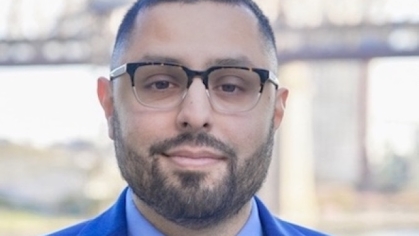Dr. Maxine Davis is an Assistant Professor and Chancellor’s Scholar for Inclusive Excellence in Intimate Partner Violence Prevention & Intervention at Rutgers School of Social Work. Dr. Davis is a second-generation activist who is passionate about discovering how to end violence perpetration in romantic and intimate relationships. She primarily studies people who act abusively and interventions that are designed to help them change. As a scholar of intimate partner violence and abuse (IPV/A), she is particularly focused on interventions to assist Black and Latino men in ending abusive behaviors in their romantic relationships.

Dr. Davis gives a glimpse into some of the research relating to Inclusion, Intersectionality, Diversity, Equity and Advancement (IIDEA) that she has recently conducted.
Tell us about one specific article or dissemination effort that relates to IIDEA (Inclusion, Intersectionality, Diversity, Equity, and Advancement) that you have worked on recently.
A significant majority of my published studies and work in progress purposefully utilize a community-engaged research approach, which I view as a gold-standard in centering the voices of historically oppressed populations in contemporary research. However, there is enormous value in other types of scientific work, including secondary analysis of quantitative data. Two recent publications of mine, one using international data and another using data from a diverse group of Baltimore residents, offer findings that provide insight into the relationship between societal factors and individual behaviors. The article I have selected for discussion in this conversation examined the link between experiencing racism and intimate partner violence (IPV) perpetration.
Why did you conduct this study?
Without generalizable evidence, it is difficult to argue that a social problem and its related phenomena are of national concern and not simply a niche issue affecting one community. Even though I am choosing to spotlight the importance of this work in my research portfolio, I cannot take credit for leading this study. Instead, I must acknowledge the gifts of collaboration and interdisciplinary science as an essential part of the meaningful research I pursue. I can, however, share how my passion, vulnerability and outspokenness have facilitated important scientific discovery and publications, including this notable piece.
I was invited to co-author “Racial discrimination, mental health symptoms, and intimate partner violence perpetration in Black adults” by the lead author Ana Maldonado not too long after meeting at a premier trauma conference. While attending the International Society for Traumatic Stress Studies conference in winter 2019, I noticed that historical trauma presentations focused on Holocaust survivors and Indigenous erasure/colonization, yet none examined U.S. chattel slavery or the residual impacts on Black Americans. In a public forum I introduced myself, my research focus on IPV perpetration of Black men, and interest in intervention solutions. I asked the panel about the noticeable gap in discussing the historical and contemporary racial trauma against Black people in the U.S. The panelists were responsive, and I was appreciative of this. Dr. Maria Yellow Horse Braveheart suggested I read the work of Dr. Joy DeGruy, Post Traumatic Slave Syndrome. That short but powerful moment is what led me to co-author this study with Maldonado, a clinical psychologist at the National Institutes of Health (NIH). She was in the audience and approached me to offer thanks for my comments, discuss some data she was examining, and our shared scholarly interests. This year, alongside other notable co-authors, we published the study/article in the Journal of Consulting and Clinical Psychology1.
How does it connect with the principles of IIDEA?
The Rutgers School of Social Work faculty voted to adopt the liberatory consciousness framework (LCF) as a conceptual/theoretical model to guide the work of the IIDEA committee, selection of partnerships, and curriculum at large to achieve our mission. Given that the LCF emphasizes awareness and analysis of oppression as key components in determining meaningful action to upend systems of oppression, both the conception and findings of this study offer readers the opportunity to think critically about why racial health disparities exist in 2022 and what steps are needed to address inequity. Pinpointing the specific mechanisms that contribute to or are responsible for racial health disparity are key parts of developing multisystemic solutions with intention and precision2.
What are the implications of your work for social policy, practice, or research?
Most current governmental policies addressing treatment for IPV perpetration provide guidelines, recommendations, or mandates on how partner abuse intervention programming (also known as batterer intervention) should be conducted. However, most policies do not draw upon the latest scientific evidence to guide their positions; rather, they often follow standard convention. Ideally, policy would be directly informed by research and mailable. Yet, that is not always the case, and some of the greatest challenges facing adequate delivery and implementation of high-quality social service provision are byproducts of rigid state, local, or organizational policies. Policies built upon outdated theoretical work should be revamped or revised to ensure that the innovation emerging from new scientific discovery reaches consumers. Policy and research directly impact social work practice and services, even if they are at odds with each other. The simplest implication of this work that will be useful across future research, policy, and micro-level practice is the revelation that for Black adults, racial discrimination directly increases risk of IPV perpetration, and the harms of this type of trauma on mental health are indirectly (yet significantly) related to IPV usage. Racism matters and is once again a major public health problem. In future studies, I will be distilling knowledge in this area further by examining racism-related stress and trauma, testing if enhanced management/recovery/coping/healing/indemnification of open and persistent racial wounds would mitigate impacts of racism on mental health and thereby reduce partner-aggressive behavior in Black populations.
What is the value of this work? Why is it important?
This work is important because it draws attention to the enduring racial assaults that Black people encounter within our everyday lives and the residual impacts of anti-Black racism beyond myopic or discrete moments of racial discrimination. If Black people are regularly burdened with fighting for our lives—struggling for the mere right to be treated as human—surely that must impact our most interpersonal relationships. However, theoretical deduction must be tested and supposition (no matter how strong the rationale) is often not enough to establish a concrete, undeniable fact. To address racial health disparities and achieve health equity, we must understand the mechanisms responsible for inequity. Unsurprisingly, a higher degree of scientific evidence is often required when referencing racism, especially of those invested in maintaining white supremacy, while other topics may be excused of such onus probandi. Ultimately, scientific fact is more difficult to refute than strong theoretical arguments, and this study is one of few providing sufficient evidence* to support the theoretical connection between experiencing racism and IPV perpetration.
References
1Maldonado, A. I., Murphy, C. M., Davis, M., Evans, M. K., & Zonderman, A. B. (2022). Racial discrimination, mental health symptoms, and intimate partner violence perpetration in Black adults. Journal of Consulting and Clinical Psychology.
Free copy: www.drmaxinedavis.com/research
2Braveman, P. A., Arkin, E., Proctor, D., Kauh, T., & Holm, N. (2022). Systemic and Structural Racism: Definitions, Examples, Health Damages, and Approaches to Dismantling. Health Affairs, 41(2), 171-178.
Free copy: www.healthaffairs.org/doi/pdf/10.1377/hlthaff.2021.01394
*There is a robust, longstanding and ongoing debate about what constitutes as legitimate and sufficient knowledge or evidence. To learn more on this topic, the following article from the Global Hub on Indigenous Peoples’ Food Systems may be of interest "Rethinking hierarchies of evidence for sustainable food systems." Nature Food 2, no. 11 (2021): 843-845.
Free copy (pre-print): https://gala.gre.ac.uk/id/eprint/35907/7/35907_KATIC_%20Rethinking_hiera...
This story was created in partnership with Rutgers School of Social Work's Inclusion, Intersectionality, Diversity, Equity, and Advancement (IIDEA) Committee in support of our commitment to diversity, equity, and inclusion.



